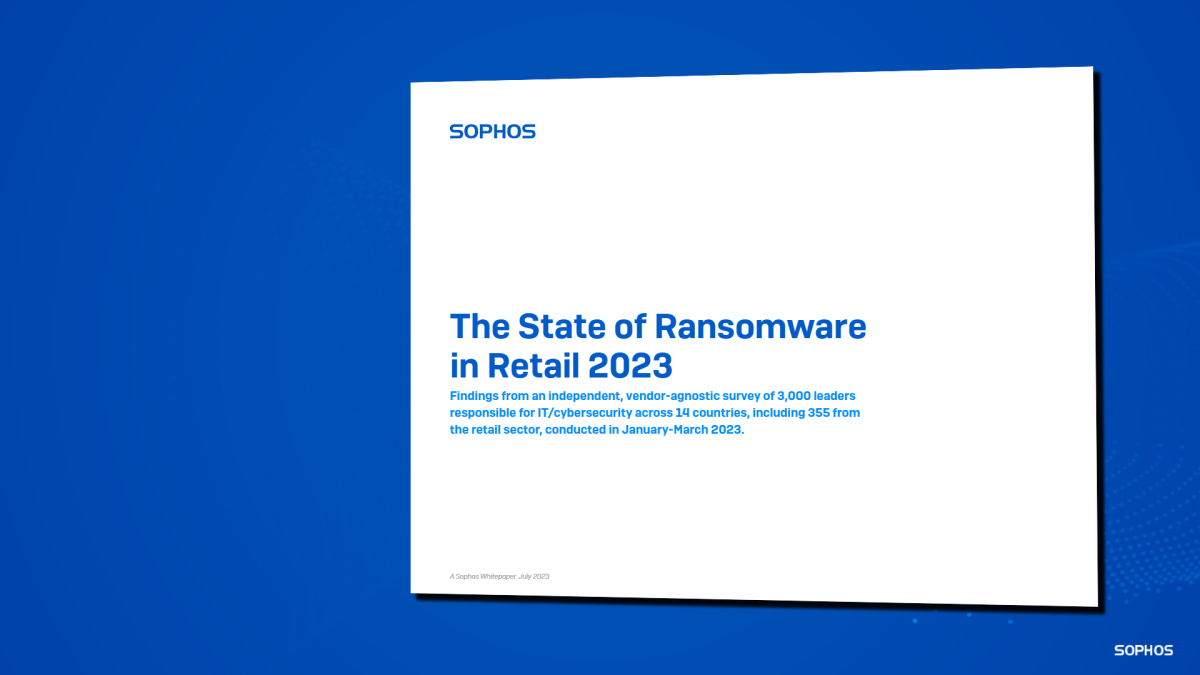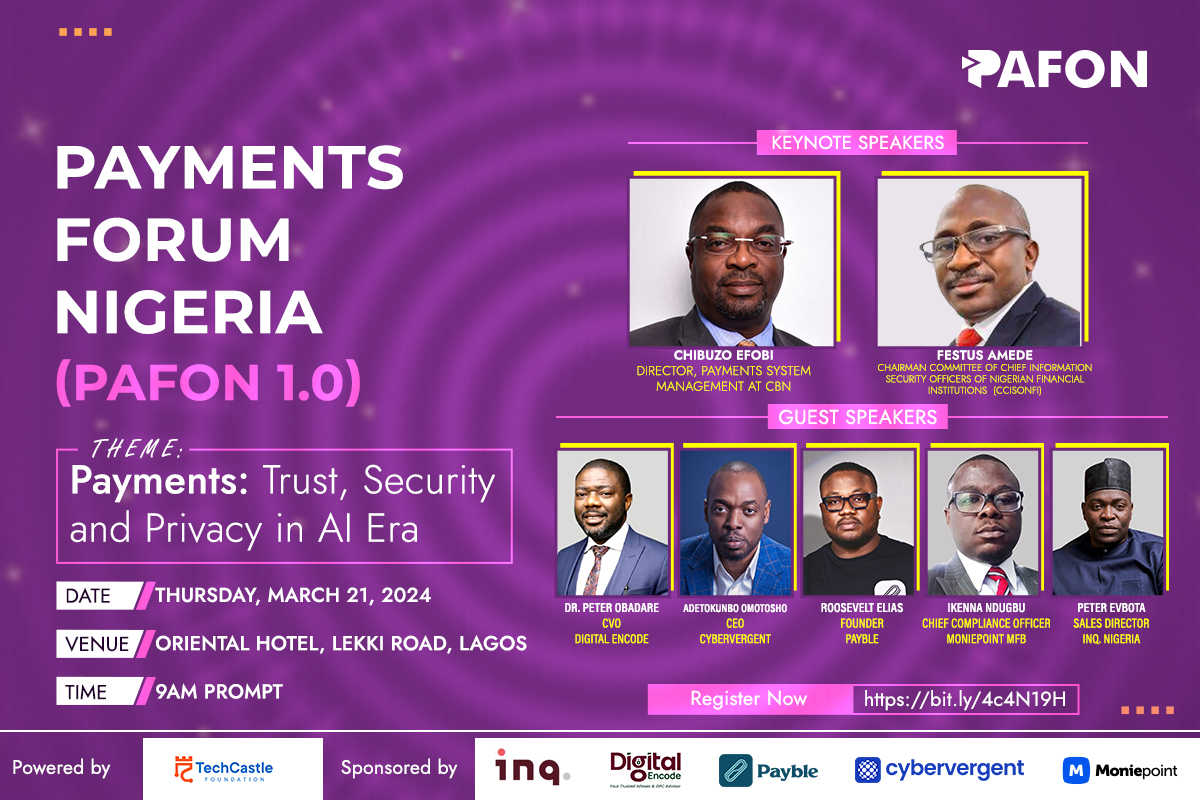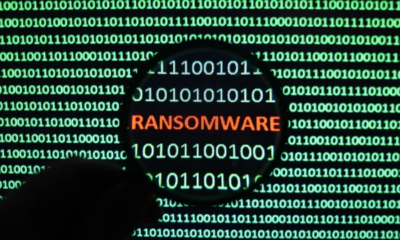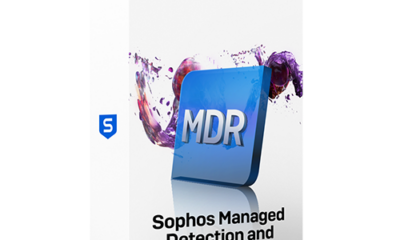TechNews
Only 26% of Surveyed Organizations Stopped Data Encryption by Cybercriminals – Sophos
Retail organizations attacked by ransomware increasingly unable to halt an attack in progress, Sophos Survey Finds, writes SANDRA ANI


- This Is the Lowest Rate of Disruption in 3 Years
Sophos, a global leader in innovating and delivering cybersecurity as a service, today shared findings from its sector survey report, “The State of Ransomware in Retail 2023,” which found that only 26% of retail organizations this past year were able to disrupt a ransomware attack before their data was encrypted.
Sophos, a global leader in innovating and delivering cybersecurity as a service, today shared findings from its sector survey report, “The State of Ransomware in Retail 2023,” which found that only 26% of retail organizations this past year were able to disrupt a ransomware attack before their data was encrypted.
This is a three-year low for the sector—a decline from 34% in 2021 and 28% in 2022—suggesting the sector is increasingly unable to halt ransomware attacks already in progress.
“Retailers are losing ground in the battle against ransomware. Ransomware criminals have been encrypting increasingly greater percentages of their retail victims in the last three years, as evidenced by the steadily declining rate of retailers stopping cybercriminal attacks in progress. Retailers must up their defensive game by setting up security that detects and responds to intrusions earlier in the attack chain,” said Chester Wisniewski, director, global field CTO, Sophos.
In addition, the report found that, for those retail organizations that paid the ransom, their median recovery costs (not including the ransom payment) were four times the recovery costs of those that used backups to recover their data ($3,000,000 versus $750,000).
“Forty-three percent of retail victims paid the ransom according to our survey respondents, yet the median recovery cost to victims who paid the ransom was four times the cost to those who used backups and other recovery methods. There are no shortcuts in these situations and rebuilding systems is almost always required. It’s better to deprive the criminals of their spoils and build back better,” said Wisniewski.
Additional key findings from the report include:
- In line with a broader, cross-sector trend, the retail sector experienced its highest rate of encryption over the past three years, with 71% of those organizations targeted by ransomware stating that attackers successfully encrypted their data
- The percentage of retail organizations attacked by ransomware declined from 77% last year to 69% this year
- The percentage of retail organizations that recovered in less than a day decreased from 15% to 9% this year, while the percentage of retail organizations that took more than a month to recover increased from 17% to 21%
Sophos recommends the following best practices to help defend against ransomware and other cyberattacks:
- Strengthen defensive shields with:
- Security tools that defend against the most common attack vectors, including endpoint protection with strong anti-ransomware and anti-exploit capabilities
- Zero Trust Network Access (ZTNA) to thwart the abuse of compromised credentials
- Adaptive technologies that respond automatically to attacks, disrupting adversaries and buying defenders time to respond
- 24/7 threat detection, investigation and response, whether delivered in-house or by a specialized Managed Detection and Response (MDR) provider
- Optimize attack preparation, including regularly backing up, practicing recovering data from backups and maintaining an up-to-date incident response plan
- Maintain security hygiene, including timely patching and regularly reviewing security tool configurations
To learn more about the State of Ransomware in Retail 2023, download the full report from Sophos.com.
The State of Ransomware 2023 survey polled 3,000 IT/cybersecurity leaders in organizations with between 100 and 5,000 employees, including 355 from the retail sector, across 14 countries in the Americas, EMEA and Asia Pacific.


Boxes have a multitude of uses, and the word “box”, lends itself to diverse contexts. For “Ajala Travelers,” the box is a necessity for keeping goods for their endless journeys. In literature, idiomatically, it can be said that “one has been boxed into a corner;” another might say to deal with a conundrum: “think outside the box;” then there is the “Pandora’s box” that no one wants opened.
To “box one’s ear’s” refers to a hit on the head, especially around one’s ears. For those who celebrate Christmas, “Boxing Day,” which is the 26th of December, the second day of Christmastide is not to be joked with: A day to unbox gifts. So much for the box.
Another type of boxes exists in the telecommunications world: The SIM Box. Have you ever received an international call but saw a local phone number ring in? That is SIM Boxing in action. Let me explain.
SIM boxing happens when a person uses a special equipment, what is called a SIM Box containing tens to hundreds of SIM Cards—from 32, to 96, to 512 and more SIMs —to terminate international calls by bringing in the international call into the SIM Box using internet connections and regenerating the calls to the called party from one of the hundred SIMs in the box.
This way, the called party will see the local number of the SIM from the SIM Box, and not the original international number calling.
With SIM Boxes, the syndicate charges international call carriers lower rates than what regular Nigerian telecommunications operators would charge, as they do not have to pay the full cost of maintaining and operating a phone network.
Basically, they are bypassing the normal route for international phone call termination to terminate international calls cheaply and making windfall profits off it.
Take for instance, a telecommunications operator in Nigeria would ordinarily charge international carriers 10cents per minute for terminating an international call in Nigeria. However, by routing the call through a SIM Boxing syndicate, the international telecommunications carrier only pays a fraction of the charge to the syndicate, say 5cents per minute and does not have to pay the full 10cents per minute charge.
The SIM Boxer will terminate this call to the called subscriber at a rate of, say N15 per minute using one of the SIM cards in their SIM Box. The SIM Boxer thus makes a killing from the differential between the rate charged to the international carrier and the rate paid to telecommunications operators whose SIM they utilise in their SIM Boxes, at the expense of our national security and income of mobile network operators and quality of our service to consumers.
Asides the revenue loss that local mobile network operators suffer courtesy the activities of these syndicates, networks face congestion around areas where the illegal call routings via SIM Boxing occurs. With the huge traffic from the boxes, callers around the area see more dropped calls, poor call quality, and slower data speeds.
The introduction of the linking of National Identity Numbers (NIN) to SIMs is one way the Federal Government has worked to tackle this criminal enterprise. With every SIM in the country being linked to an NIN, an identity is tied to the owner of each line, and regulators now have visibility of ownership. That is not all. There is also the “Max-4 Rule” where a subscriber is not allowed to have more than four lines per network operator linked to his NIN. With this rule in place, coupled with the NIN-SIM Linkage, every telephone subscriber in Nigeria would not just be accurately identifiable but limited to having only four telephone lines per subscriber.
To enforce this rule, the Nigerian Communications Commission (NCC) on the 29th of March 2024 announced the deadline for Mobile Network Operators to bar all subscribers who had five lines and above, and whose NIN failed the verification test of biometrics matching.
Over the last few weeks, sources within the NCC have confirmed cases where a single NIN was linked to over 100,000 lines.
Some NINs had well over 10,000 SIMS linked to them, others over a thousand, others had hundreds. Many have questioned the reports and asked, what would any single reasonable person be doing with these number of lines? Justifiable questions, because no sane person—who is not running a business—should own more than five SIM cards.
Given the ‘Max 4 Rule’ in place and the NIN-SIM Linkage Policy, SIM Boxers have been boxed into a corner.
The applications they use require tens to thousands of SIM Cards, and the imperative to stay anonymous. If these policies are well and fully implemented, this is the death knell for SIM Boxing merchants.
But the regulator, NCC needs to be fast and ready for the battle ahead. SIM Boxing is a billion-dollar criminal enterprise. They are not going to go down without a fight. It is like taking a bone being chewed from the mouth of a bulldog.
Already, the battle seems to have kicked off. A lawyer, Barrister Olukoya Ogunbeje has recently taken the Federal Government, NCC and Mobile Network Operators to court, claiming that the barring of SIMs not linked to NINs goes against his fundamental human rights, and has cost him the loss of business opportunities.
Anyone who has Nigeria’s interest at heart ordinarily supports this policy. It then does not add up seeing a so-called activist lawyer take up such a matter that is clearly against the public interest—unless this is the Haka cry of SIM Boxers.
A most interesting observation with his case is that it is not even a class action, but individually driven. It begs the question then, who is funding Barr. Olukoya Ogungbeje? What is his interest in fighting this policy that puts paid to the business of a criminal enterprise? Is he funded by interests in the SIM Boxing world? Time would tell. But in the meantime, NCC must go head on without fear or intimation and clean the Augean stable of SIM ownership in Nigeria.
Suleiman Bala Bakori is a researcher, and writes from the FCT.
TechNews
inq.Digital Supports Payments Forum Nigeria [PAFON 1.0]


Inq. Digital Nigeria Limited has been announced as a sponsor of Payments Forum Nigeria [PAFON 1.0] maiden edition holding this Thursday in Lagos.
inq. Digital Nigeria Limited, a subsidiary of inq. Group is an emerging leading digital and cloud solutions provider that delivers simpler seamless solutions to complex business challenges.
With offices in Lagos, Abuja, Port Harcourt and Kano, inq. provides reliable and affordable Intelligent Connectivity, SDN/NFV, Cloud and Digital services (including Edge –AI) for Nigerian businesses including those in the payment space.
Participation is FREE, however, pre-registration is required: https://bit.ly/4c4N19H.
Speaking ahead of Payments Forum Nigeria [PAFON 1,0] scheduled to take place at Oriental Hotel, Lekki Road, Lagos on Thursday, March 21, 2024 by 9am under the theme: “Payments: Trust, Security and Privacy in AI Era”, Mr. Chike Onwuegbuchi, the co-founder of TechCastle Foundation, the organisers, said the goal is to enable information exchange and knowledge sharing on key industry insights issues amongst key stakeholders, with the objective of ensuring a collaborative and proactive approach to push for policies that enable growth, tackling/mitigating fraud and limiting occurrences and losses.
Speakers
The following speakers are lined up for the Forum: Chibuzo Efobi, Director, Payments System Management, Central Bank of Nigeria (CBN); Festus Amede, Chairman, Committee of Chief Information Security Officers of Nigerian Financial institutions (CCISONFI; Dr. Adewale Peter Obadare, Chief Visionary Officer (CVO), Digital Encode Limited; Adetokunbo Omotosho, Chief Executive Officer, Cybervergent; Roosevelt Elias, Founder, Payble; Ikenna Ndugbu, chief compliance officer, Moniepoint MFB, and Peter Evbota, Sales Director at inq. Digital Nigeria Limited.
Payments Forum Nigeria is organised by TechCastle Foundation and sponsored by: inq. Digital Nigeria Limited, Cybervergent, Moniepoint, Digital Encode Limited, Payble with support from the Central Bank of Nigeria (CBN).
Business
Meet Kingsley Adonu


In the dynamic world of entrepreneurship, there are visionaries who not only navigate the business landscape but redefine it. Meet Kingsley Adonu, the Founder and Chief Executive Officer of the SMobile Group, a conglomerate that stands as a beacon of excellence and diversity in the global business arena.
Kingsley Adonu is a visionary entrepreneur and the Founder of the SMobile Group, a conglomerate synonymous with excellence and diversity. As the Chief Executive Officer, he has steered the group to remarkable heights, overseeing a spectrum of businesses that span across Telecommunications, Oil and Gas, Real Estate, Hospitality, Water Production, Agriculture, Technology, E-commerce, Energy, Sports, Entertainment, Education, Health, Logistics and Financial Services, with branches extending globally to UK, USA, China, South Africa, and Canada.
Under Kingsley’s astute leadership, SMobile Group has emerged as a major partner for MTN, evident in the impactful presence of the SMobile brand in the telecommunications landscape. His strategic insights and forward-thinking approach have positioned the group as a dynamic player in multiple industries.
Beyond the boardroom, Kingsley Adonu is a dedicated philanthropist, committed to making a positive impact in communities. His philanthropic efforts extend beyond business, reflecting a deep-seated belief in the responsibility of successful individuals to contribute meaningfully to society.
Kingsley’s influence is not confined to national borders; he has actively participated in numerous international telecom conferences, further enriching his understanding of global industry trends and fostering valuable connections with industry leaders worldwide.
With an unwavering commitment to excellence, Kingsley Adonu continues to inspire and lead the SMobile Group towards new horizons, blending business acumen with a passion for positive societal change.
-



 Startups5 days ago
Startups5 days agoScaleup with STEP: How STEP Empowering Startups & Talent in Africa
-



 Foods4 days ago
Foods4 days agoTwisco, Cowbell Choco & Miksi Choco World Chocolate Day Campaign Create Delightful Memories for Families
-



 News4 days ago
News4 days agoCJN, Makinde, Lawyers, Associates Pay Glowing Tributes to Late Justice Gbolagunte
-



 Education16 hours ago
Education16 hours agoVDL International Conference Highlights Fostering Ethical Values in the Society


















